leave用法
leave的用法

leave的用法Leave是一个多义词,在不同的语境下可以表示不同的含义。
在本文中,我们将探讨leave作为动词的几种不同用法。
一、表示离开或放弃1. Leave表示离开一个地方或某个位置。
例句:- He left the office early today.- The train leaves in ten minutes.2. Leave表示永久性的离开或放弃某事物。
例句:- She decided to leave her job and pursue her passion.- They left their hometown and moved to the city.3. Leave还可以表示放弃或退出某个组织或团体。
例句:- He left the club after the disagreement with other members.- She decided to leave the team due to personal reasons.二、表示留下或忘带1. Leave表示留下某人或某物在某个地方。
- Please leave your luggage at the reception desk.- Don't leave the children alone at home.2. Leave还可以表示忘带某物。
例句:- I'm sorry, I left my keys at home.- He always leaves his phone in the office.三、表示残留或遗忘1. Leave还可以表示某物在某个地方残留下来。
例句:- The red wine left a stain on the carpet.- The strong wind left a trail of destruction in its path.2. Leave也可以表示留下或遗忘某事物。
leave 的用法

leave 的用法Leave是一个常见的英语单词,它有多种用法和意思。
本文将详细介绍leave的各种用法,并提供相关例句,帮助读者更好地理解和掌握这个单词。
一、作为动词的leave1.离开Leave最常见的意思是“离开”,可以用来表示人或物体从某个地方离开。
例如:She left the party early.(她早早就离开了派对。
)He left his hometown for a better job.(他为了更好的工作离开了故乡。
)2.留下除了表示离开,leave还可以表示“留下”,即让某物或某人待在原地。
例如:Please leave your coat in the cloakroom.(请把你的外套留在衣帽间。
)The teacher asked the students to leave their phones outsidethe classroom.(老师要求学生们把手机留在教室外面。
)3.放弃Leave还可以表示“放弃”,即停止做某件事或不再拥有某物。
例如:I decided to leave my job and start my own business.(我决定辞职创业。
)He left his bad habits behind and became a better person.(他放弃了坏习惯,变成了一个更好的人。
)4.遗忘Leave还可以表示“遗忘”,即忘记某事或某物。
例如:I left my keys at home.(我把钥匙忘在家里了。
)Don't leave your homework until the last minute.(不要把作业拖到最后一刻。
)二、leave作为名词的用法除了作为动词,leave还可以作为名词使用,表示“假期”或“休息时间”。
例如:I have some leave coming up next month.(下个月我有一些假期。
leave的用法和常见搭配
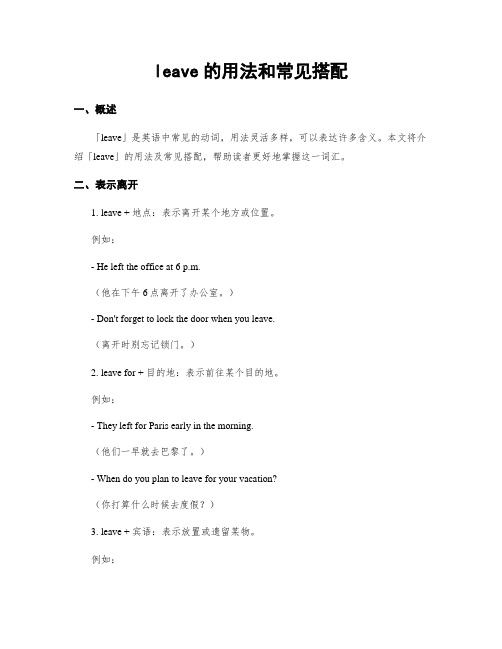
leave的用法和常见搭配一、概述「leave」是英语中常见的动词,用法灵活多样,可以表达许多含义。
本文将介绍「leave」的用法及常见搭配,帮助读者更好地掌握这一词汇。
二、表示离开1. leave + 地点:表示离开某个地方或位置。
例如:- He left the office at 6 p.m.(他在下午6点离开了办公室。
)- Don't forget to lock the door when you leave.(离开时别忘记锁门。
)2. leave for + 目的地:表示前往某个目的地。
例如:- They left for Paris early in the morning.(他们一早就去巴黎了。
)- When do you plan to leave for your vacation?(你打算什么时候去度假?)3. leave + 宾语:表示放置或遗留某物。
例如:- She left her bag on the table and went outside.(她把包放在桌子上出去了。
)- Please don't leave any trash behind.(请不要留下任何垃圾。
)4. leave (sb.) alone:表示不干涉或不打扰某人。
例如:- Leave me alone! I need some quiet time.(别打扰我!我需要一些安静时间。
)- Mom, can you please just leave us alone for a while?(妈妈,你能不能别打扰我们一会儿?)三、表示遗忘或忽略1. leave + 宾语 + 某状态:表示忘记或未关心某事物的状态。
例如:- I left the soup boiling on the stove and it burned.(我把汤放在炉子上煮着,结果它糊了。
)- He left his phone on silent during the meeting and missed an important call.(他在会议期间把手机调成静音,错过了一个重要电话。
leave的用法
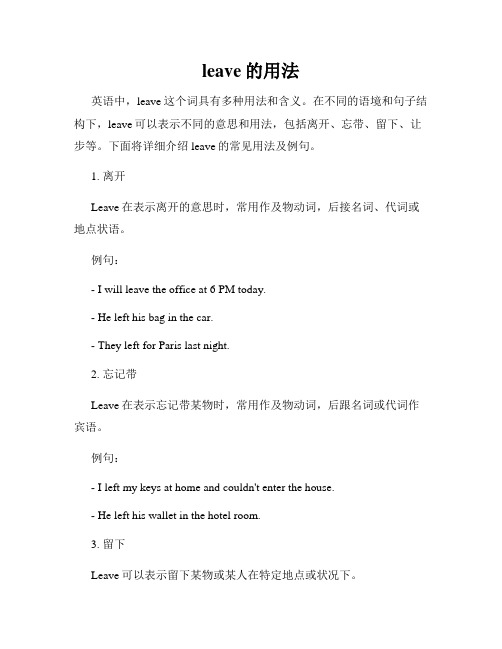
leave的用法英语中,leave这个词具有多种用法和含义。
在不同的语境和句子结构下,leave可以表示不同的意思和用法,包括离开、忘带、留下、让步等。
下面将详细介绍leave的常见用法及例句。
1. 离开Leave在表示离开的意思时,常用作及物动词,后接名词、代词或地点状语。
例句:- I will leave the office at 6 PM today.- He left his bag in the car.- They left for Paris last night.2. 忘记带Leave在表示忘记带某物时,常用作及物动词,后跟名词或代词作宾语。
例句:- I left my keys at home and couldn't enter the house.- He left his wallet in the hotel room.3. 留下Leave可以表示留下某物或某人在特定地点或状况下。
- Please leave your contact information with the receptionist.- The teacher leaves us with a lot of homework every day.- Don't leave your children alone at home.4. 赋予Leave可以表示赋予或给予某人某种印象、影响或结果。
例句:- The movie left a deep impression on me.- The accident left him with a broken leg.- His speech left the audience speechless.5. 让步Leave可以表示让步或放弃某个观点、立场或决定。
例句:- Although it's expensive, I have to leave that option open.- I reluctantly left my plan to travel and stayed at home.- The company had to leave the project due to financial difficulties.6. 剩余Leave还可以表示剩余或保留某物。
leave的用法及短语
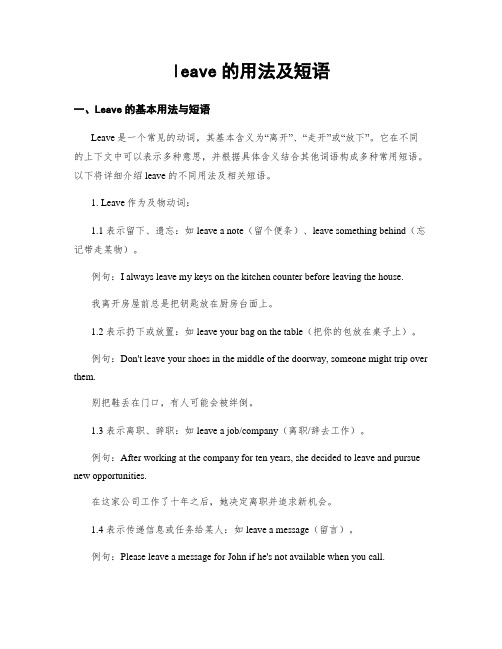
leave的用法及短语一、Leave的基本用法与短语Leave是一个常见的动词,其基本含义为“离开”、“走开”或“放下”。
它在不同的上下文中可以表示多种意思,并根据具体含义结合其他词语构成多种常用短语。
以下将详细介绍leave的不同用法及相关短语。
1. Leave作为及物动词:1.1 表示留下、遗忘:如leave a note(留个便条)、leave something behind(忘记带走某物)。
例句:I always leave my keys on the kitchen counter before leaving the house.我离开房屋前总是把钥匙放在厨房台面上。
1.2 表示扔下或放置:如leave your bag on the table(把你的包放在桌子上)。
例句:Don't leave your shoes in the middle of the doorway, someone might trip over them.别把鞋丢在门口,有人可能会被绊倒。
1.3 表示离职、辞职:如leave a job/company(离职/辞去工作)。
例句:After working at the company for ten years, she decided to leave and pursue new opportunities.在这家公司工作了十年之后,她决定离职并追求新机会。
1.4 表示传递信息或任务给某人:如leave a message(留言)。
例句:Please leave a message for John if he's not available when you call.如果约翰不在的话,请给他留个信息。
2. Leave作为不及物动词:2.1 表示离开某地、离去:如leave for work(去上班)、leave from the airport (从机场离开)。
leave的用法
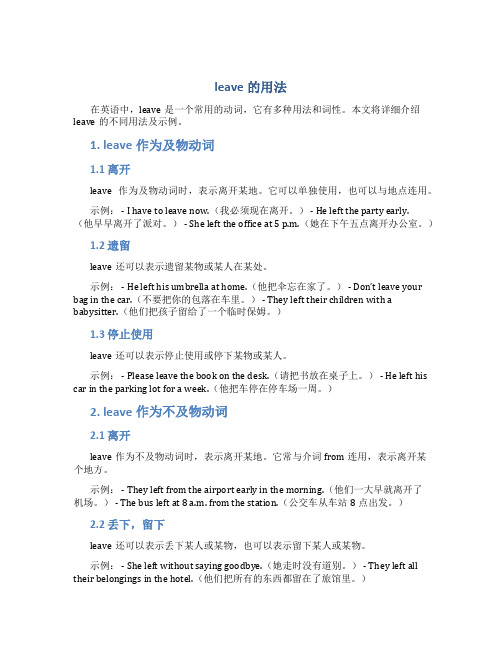
leave的用法在英语中,leave是一个常用的动词,它有多种用法和词性。
本文将详细介绍leave的不同用法及示例。
1. leave作为及物动词1.1 离开leave作为及物动词时,表示离开某地。
它可以单独使用,也可以与地点连用。
示例: - I have to leave now.(我必须现在离开。
) - He left the party early.(他早早离开了派对。
) - She left the office at 5 p.m.(她在下午五点离开办公室。
)1.2 遗留leave还可以表示遗留某物或某人在某处。
示例: - He left his umbrella at home.(他把伞忘在家了。
) - Don’t leave your bag in the car.(不要把你的包落在车里。
) - They left their children with a babysitter.(他们把孩子留给了一个临时保姆。
)1.3 停止使用leave还可以表示停止使用或停下某物或某人。
示例: - Please leave the book on the desk.(请把书放在桌子上。
) - He left his car in the parking lot for a week.(他把车停在停车场一周。
)2. leave作为不及物动词2.1 离开leave作为不及物动词时,表示离开某地。
它常与介词from连用,表示离开某个地方。
示例: - They left from the airport early in the morning.(他们一大早就离开了机场。
) - The bus left at 8 a.m. from the station.(公交车从车站8点出发。
)2.2 丢下,留下leave还可以表示丢下某人或某物,也可以表示留下某人或某物。
示例: - She left without saying goodbye.(她走时没有道别。
leave 用法
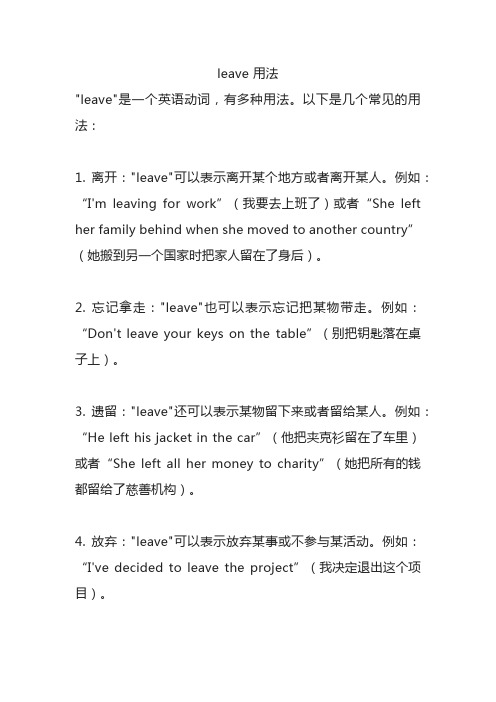
leave 用法
"leave"是一个英语动词,有多种用法。
以下是几个常见的用法:
1. 离开:"leave"可以表示离开某个地方或者离开某人。
例如:“I'm leaving for work”(我要去上班了)或者“She left her family behind when she moved to another country”(她搬到另一个国家时把家人留在了身后)。
2. 忘记拿走:"leave"也可以表示忘记把某物带走。
例如:“Don't leave your keys on the table”(别把钥匙落在桌子上)。
3. 遗留:"leave"还可以表示某物留下来或者留给某人。
例如:“He left his jacket in the car”(他把夹克衫留在了车里)或者“She left all her money to charity”(她把所有的钱都留给了慈善机构)。
4. 放弃:"leave"可以表示放弃某事或不参与某活动。
例如:“I've decided to leave the project”(我决定退出这个项目)。
5. 允许/允诺:"leave"也可以表示允许或允诺某事。
例如:“My boss gave me leave to take a vacation”(我的老板允许我休假)。
需要注意的是,"leave"是一个多义词,具体用法可能根据语境而有所不同。
leave用法及固定搭配
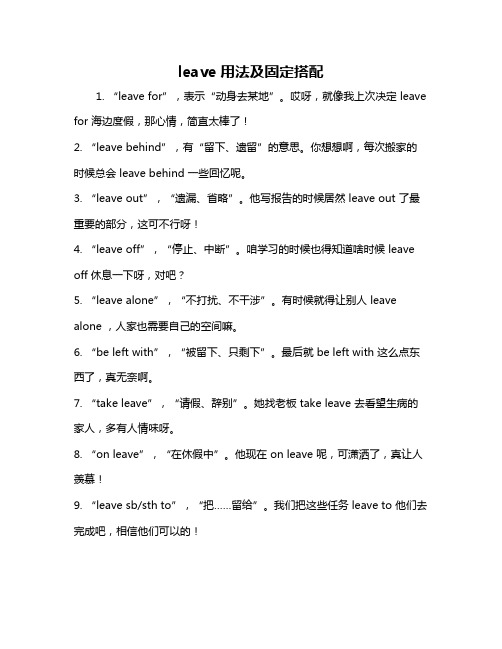
leave用法及固定搭配
1. “leave for”,表示“动身去某地”。
哎呀,就像我上次决定 leave for 海边度假,那心情,简直太棒了!
2. “leave behind”,有“留下、遗留”的意思。
你想想啊,每次搬家的时候总会 leave behind 一些回忆呢。
3. “leave out”,“遗漏、省略”。
他写报告的时候居然 leave out 了最重要的部分,这可不行呀!
4. “leave off”,“停止、中断”。
咱学习的时候也得知道啥时候 leave off 休息一下呀,对吧?
5. “leave alone”,“不打扰、不干涉”。
有时候就得让别人 leave alone ,人家也需要自己的空间嘛。
6. “be left with”,“被留下、只剩下”。
最后就 be left with 这么点东西了,真无奈啊。
7. “take leave”,“请假、辞别”。
她找老板 take leave 去看望生病的家人,多有人情味呀。
8. “on leave”,“在休假中”。
他现在 on leave 呢,可潇洒了,真让人羡慕!
9. “leave sb/sth to”,“把……留给”。
我们把这些任务 leave to 他们去完成吧,相信他们可以的!
我的观点结论就是:这些 leave 的用法及固定搭配都超级实用呀,大家一定要好好掌握哦!。
leave的意思和用法

leave的意思和用法
"leave" 在英语中可以作为动词和名词使用,具体意思和用法如下:
作为动词:
1. 离开:表示离开某个地方或离开某人。
例如:"I need to leave now."(我现在需要离开了。
)
2. 离去:表示离开某个位置或某个状态。
例如:"She left the room."(她离开了房间。
)
3. 遗留,留下:表示在某地或某个情况下留下。
例如:"He left a note on the table."(他在桌子上留了个便条。
)
4. 放弃,停止从事:表示停止或放弃某个活动或职责。
例如:"He decided to leave his job."(他决定辞去工作。
)
作为名词:
1. 离开,离去:表示离开某个地方的行为或状态。
例如:"His sudden leave surprised us."(他突然的离开让我们吃惊。
)
2. 休假,假期:表示离开工作或学校的时间段。
例如:"I'm going on leave next week."(我下周要休假。
)
需要注意的是,"leave" 这个词还可以有其他的词性和意思,在不同的语境下可能会有不同的用法和解释。
上述解释仅涵盖了一些常见的
用法和意思。
leave的用法及搭配
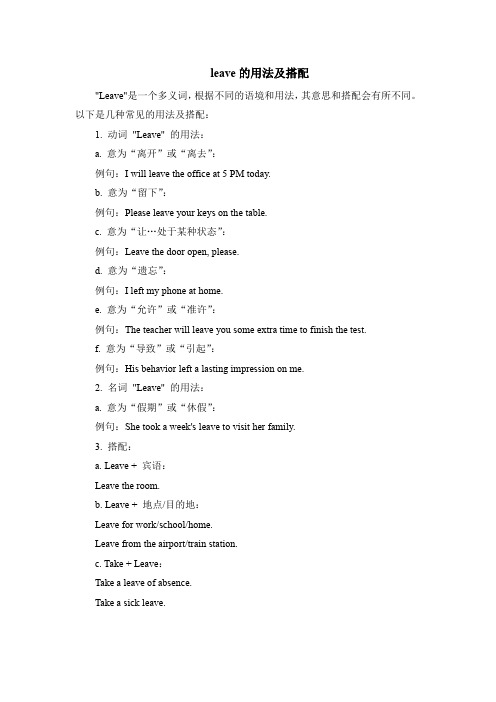
leave的用法及搭配"Leave"是一个多义词,根据不同的语境和用法,其意思和搭配会有所不同。
以下是几种常见的用法及搭配:1. 动词"Leave" 的用法:a. 意为“离开”或“离去”:例句:I will leave the office at 5 PM today.b. 意为“留下”:例句:Please leave your keys on the table.c. 意为“让…处于某种状态”:例句:Leave the door open, please.d. 意为“遗忘”:例句:I left my phone at home.e. 意为“允许”或“准许”:例句:The teacher will leave you some extra time to finish the test.f. 意为“导致”或“引起”:例句:His behavior left a lasting impression on me.2. 名词"Leave" 的用法:a. 意为“假期”或“休假”:例句:She took a week's leave to visit her family.3. 搭配:a. Leave + 宾语:Leave the room.b. Leave + 地点/目的地:Leave for work/school/home.Leave from the airport/train station.c. Take + Leave:Take a leave of absence.Take a sick leave.。
leave的四种用法
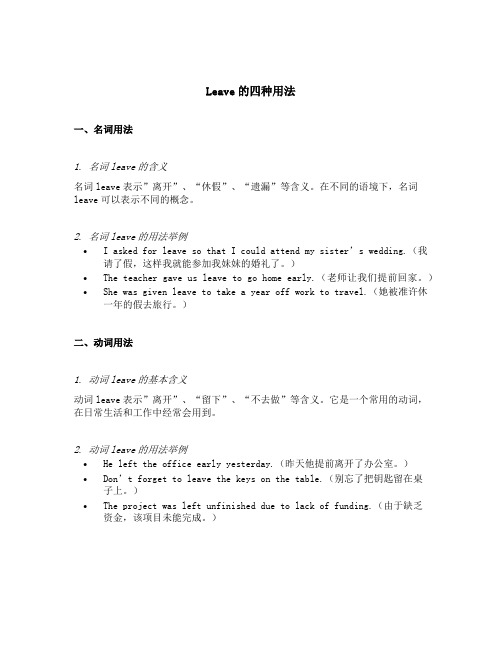
Leave的四种用法一、名词用法1. 名词leave的含义名词leave表示”离开”、“休假”、“遗漏”等含义。
在不同的语境下,名词leave可以表示不同的概念。
2. 名词leave的用法举例•I asked for leave so that I could attend my sister’s wedding.(我请了假,这样我就能参加我妹妹的婚礼了。
)•The teacher gave us leave to go home early.(老师让我们提前回家。
)•She was given leave to take a year off work to travel.(她被准许休一年的假去旅行。
)二、动词用法1. 动词leave的基本含义动词leave表示”离开”、“留下”、“不去做”等含义。
它是一个常用的动词,在日常生活和工作中经常会用到。
2. 动词leave的用法举例•He left the office early yesterday.(昨天他提前离开了办公室。
)•Don’t forget to leave the keys on the table.(别忘了把钥匙留在桌子上。
)•The project was left unfinished due to lack of funding.(由于缺乏资金,该项目未能完成。
)三、短语动词leave behind1. 短语动词leave behind的含义短语动词leave behind表示”留下”、“遗忘”的含义,常用于描述遗忘某物或某人的情况。
2. 短语动词leave behind的用法举例•He left his backpack behind in the classroom.(他把背包落在教室里了。
)•Don’t forget to check your luggage and make sure nothing is left behind.(别忘了检查行李,确保没有遗漏东西。
leave的用法
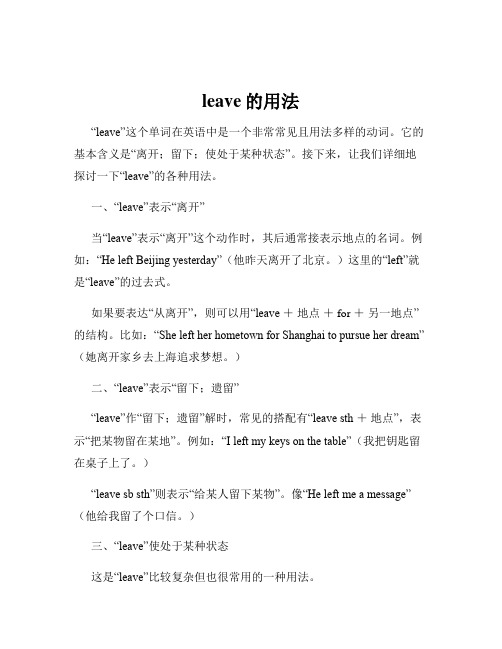
leave的用法“leave”这个单词在英语中是一个非常常见且用法多样的动词。
它的基本含义是“离开;留下;使处于某种状态”。
接下来,让我们详细地探讨一下“leave”的各种用法。
一、“leave”表示“离开”当“leave”表示“离开”这个动作时,其后通常接表示地点的名词。
例如:“He left Beijing yesterday”(他昨天离开了北京。
)这里的“left”就是“leave”的过去式。
如果要表达“从离开”,则可以用“leave +地点+ for +另一地点”的结构。
比如:“She left her hometown for Shanghai to pursue her dream”(她离开家乡去上海追求梦想。
)二、“leave”表示“留下;遗留”“leave”作“留下;遗留”解时,常见的搭配有“leave sth +地点”,表示“把某物留在某地”。
例如:“I left my keys on the table”(我把钥匙留在桌子上了。
)“leave sb sth”则表示“给某人留下某物”。
像“He left me a message”(他给我留了个口信。
)三、“leave”使处于某种状态这是“leave”比较复杂但也很常用的一种用法。
“leave +宾语+宾语补足语”的结构中,宾语补足语可以是形容词、现在分词、过去分词、介词短语等。
例如:“The bad news left him sad”(这个坏消息使他伤心。
)这里的“sad”是形容词作宾语补足语。
“He left the door open”(他让门开着。
)“open”是形容词,表示状态。
“She left the children playing in the garden”(她让孩子们在花园里玩。
)“playing”是现在分词,强调动作正在进行。
“The accident left him injured”(这场事故使他受伤了。
leave的用法和固定搭配

leave的用法和固定搭配一、Leave的基本用法Leave是一个常见的英语动词,用于表示离开或者放弃某个地方、职位或状态。
它可以单独使用,也可以和其他词组成固定搭配。
接下来将介绍leave的基本用法以及其固定搭配。
1. Leave作为不及物动词指代离开某地或结束某项活动时,它常与介词from连用,表示"从......离开"。
例如:- He left from the office early yesterday.他昨天早退了办公室。
2. Leave也可以表示把某物留在某处,常与名词和介词for连用。
例如:- She left a note for me on the table.她在桌上给我留了一个便条。
二、Leave的固定搭配1. Leave sb./sth. alone: 不打扰/不碰某人或者某物。
该短语中alone作为副词,修饰leave,意思是让对方保持安宁或者对某人不加干涉。
例如:- Please leave me alone, I need some quiet time.请别打扰我,我需要一些安静的时间。
2. Leave sth. behind: 忘记带走当我们在外出时经常会忘记带走一些东西,这时就可以使用这个短语。
例如:- I left my umbrella behind in the restaurant.我在餐馆忘记带伞了。
3. Leave sth. for sb.: 为某人留下某物当我们不在家时,可以留下一些消息或者事物给在家的人。
例如:- I left some dinner for you in the fridge.我在冰箱里给你留了一些晚餐。
4. Leave sth. to chance: 随机对待,不做特定安排有时候我们可能会决定不做任何特定的安排或者计划,而是让事情自然发展。
例如:- Instead of making a schedule, let's just leave it to chance and see what happens.我们不制定计划,就随它自然发展吧,看看会发生什么。
leave留下用法
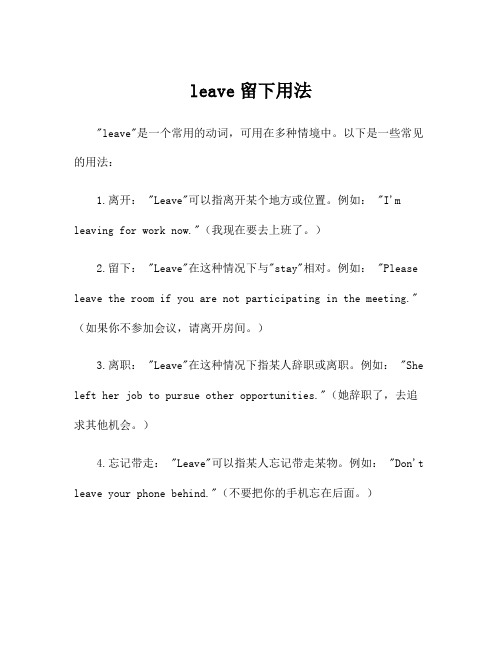
leave留下用法"leave"是一个常用的动词,可用在多种情境中。
以下是一些常见的用法:1.离开: "Leave"可以指离开某个地方或位置。
例如: "I'm leaving for work now."(我现在要去上班了。
)2.留下: "Leave"在这种情况下与"stay"相对。
例如: "Please leave the room if you are not participating in the meeting."(如果你不参加会议,请离开房间。
)3.离职: "Leave"在这种情况下指某人辞职或离职。
例如: "She left her job to pursue other opportunities."(她辞职了,去追求其他机会。
)4.忘记带走: "Leave"可以指某人忘记带走某物。
例如: "Don't leave your phone behind."(不要把你的手机忘在后面。
)5.遗留: "Leave"还可以表示某人或某物遗留下来。
例如: "Her death left a lasting impact on the community."(她的去世给社区留下了持久的影响。
)此外,"leave"还可以结合其他词构成一些常见的短语或表达,例如"leave out"(省略,遗漏),"leave behind"(留下,遗留),"leave off"(停止,结束)等。
总结:"leave"是一个多义词,可指离开、留下、离职、遗忘带走等。
leave的用法总结

leave的意思vt. 离开;遗弃;忘了带;交托vt.& vi. 离去;出发;舍弃;n. 准假;假期;辞别;许可leave的用法leave除了作"离开"解以外,还有以下几种特殊用法: 一、作"留下"、"丢下"、"落下",常表示某物落在/忘在某地。
如: You'd better leave your address and telephone number. 你最好留下你的地址和电话号码。
二、表示"留给"、"交给",一般与介词with或to搭配。
如: Leave it with / to me and I'll see what I can do. 把它交给我,我就知道该怎么办。
三、leave作使役动词,表示"使/ 让……保持某种状态"。
1、用形容词作宾语补足语 Leave the door open when you go out. 出去时,不要关门。
2、用不定式作宾语补足语 Leave him to do it himself. 让他自个儿去做。
3、用现在分词作宾语补足语 They walked off and left me sitting there alone. 他们走开了,让我一个人坐在那儿。
4、用过去分词作宾语补足语 Did you leave the doors and windows properly fastened? 你把门窗关好了吗? 5、还可用名词、介词短语等作宾语补足语 His parents both died last year, leaving him an orphan. 他父母去年双双去世,留下他成为一个孤儿。
四、leave的过去分词left,常用作后置定语,表示"剩下的"。
leave用法总结
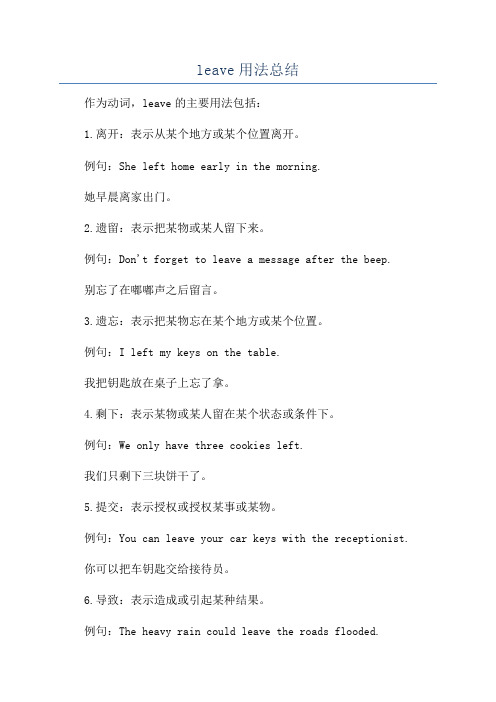
leave用法总结作为动词,leave的主要用法包括:1.离开:表示从某个地方或某个位置离开。
例句:She left home early in the morning.她早晨离家出门。
2.遗留:表示把某物或某人留下来。
例句:Don't forget to leave a message after the beep.别忘了在嘟嘟声之后留言。
3.遗忘:表示把某物忘在某个地方或某个位置。
例句:I left my keys on the table.我把钥匙放在桌子上忘了拿。
4.剩下:表示某物或某人留在某个状态或条件下。
例句:We only have three cookies left.我们只剩下三块饼干了。
5.提交:表示授权或授权某事或某物。
例句:You can leave your car keys with the receptionist.你可以把车钥匙交给接待员。
6.导致:表示造成或引起某种结果。
例句:The heavy rain could leave the roads flooded.大雨可能会导致道路被淹。
作为名词,leave可以指假期、休假或退休等。
例句:I need to take a leave from work to attend my sister's wedding.我需要请假去参加我姐姐的婚礼。
作为形容词,leave可以用来描述某人的感觉或心情,通常表示他们感到孤独、放纵或茫然。
例句:She felt alone and lonely, with a sense of leave behind.她感到孤独、寂寞,有些遗世独立的感觉。
除了以上的常见用法,leave还有一些常见的短语搭配和习惯用法,如下:1. leave out:遗漏;忽略例句:She left out some important details in her report.她在报告中遗漏了一些重要细节。
leave的用法及搭配
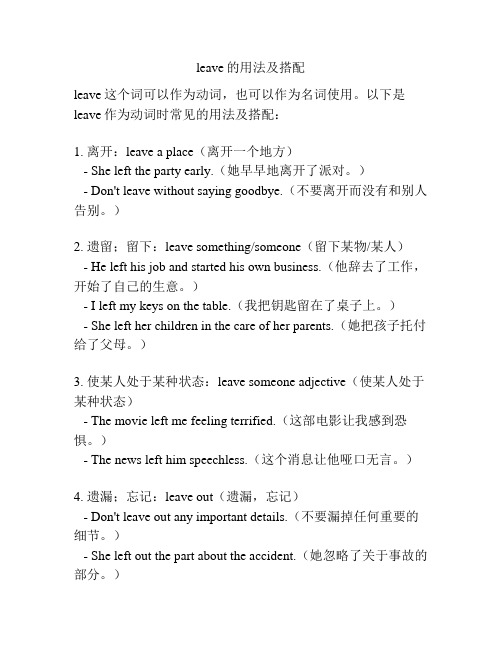
leave的用法及搭配leave这个词可以作为动词,也可以作为名词使用。
以下是leave作为动词时常见的用法及搭配:1. 离开:leave a place(离开一个地方)- She left the party early.(她早早地离开了派对。
)- Don't leave without saying goodbye.(不要离开而没有和别人告别。
)2. 遗留;留下:leave something/someone(留下某物/某人)- He left his job and started his own business.(他辞去了工作,开始了自己的生意。
)- I left my keys on the table.(我把钥匙留在了桌子上。
)- She left her children in the care of her parents.(她把孩子托付给了父母。
)3. 使某人处于某种状态:leave someone adjective(使某人处于某种状态)- The movie left me feeling terrified.(这部电影让我感到恐惧。
)- The news left him speechless.(这个消息让他哑口无言。
)4. 遗漏;忘记:leave out(遗漏,忘记)- Don't leave out any important details.(不要漏掉任何重要的细节。
)- She left out the part about the accident.(她忽略了关于事故的部分。
)以下是leave作为名词时的用法:1. 休假;请假:take a leave(休假,请假)- He is on leave for a week.(他休假一周。
)- I need to take a leave of absence from work.(我需要休一段时间的假。
leave的四种用法

leave的四种用法一、leave作为动词的基本用法1.1 leave的基本含义Leave作为动词,最基本的含义是“离开”,指某人或物从某个地方或状态中出去或脱离。
例如:- She left the room.(她离开了房间。
)- The train leaves at 10:30.(火车在10:30离开。
)1.2 leave与介词连用的用法Leave还可以与介词连用,构成一些固定短语,表示特定的意义。
常见的有:- leave for:动身去某处- leave behind:留下- leave out:省略- leave off:停止例如:- We are leaving for Beijing tomorrow morning.(我们明天早上出发去北京。
)- He always leaves his homework behind.(他总是把作业落在家里。
)- Don't leave out any details in your report.(你的报告中不要漏掉任何细节。
)- The children left off playing when it started to rain.(下雨开始时孩子们停止玩耍。
)二、leave作为名词的用法2.1 leave作为名词的含义Leave还可以作为名词使用,表示“休假”、“假期”等意义。
例如:- I'm going to take a week's leave next month.(我下个月要请一个星期假。
)- He has been on sick leave for two weeks.(他已经病假两周了。
)2.2 leave作为名词的用法Leave作为名词还可以与其他单词组合成一些固定短语,表示特定的意义。
常见的有:- annual leave:年假- maternity leave:产假- paternity leave:陪产假- sick leave:病假例如:- I have 20 days of annual leave every year.(我每年有20天的年假。
leave的用法和固定搭配

leave的用法和固定搭配
1.leave+地点离开某地
leave the room 离开房间leave the library 离开图书馆
2.leave for +目的地动身去某地
leave for the station 动身去车站
I am leaving for Hongkong tomorrow. 我明天去香港。
3.leave A for B 离开A去往B
Tom is leaving Qingdao for Shanghai. 汤姆要离开青岛去上海。
4.“leave sth./sb. + 时间”表示“把某事搁置到某时”
He always leaves the things till next day.
他总是把事情留到第二天。
5. v. “让…处于…(状态)
leave me alone. 让我静静。
leave the window open 让窗户开着
6. n. 假期、准假
ask for a leave 请假
7.leave a message for sb. 给某人留口信Can I leave a message for him? 我可以给他留口信吗?
8.leave sth./sb. + 地点”“把某人/某物留在或者落在某地”
I left my pen in the classroom. 我把钢笔落在教室了。
He left his children in the supermarket
yesterday. 昨天他把孩子们落在超市了。
- 1、下载文档前请自行甄别文档内容的完整性,平台不提供额外的编辑、内容补充、找答案等附加服务。
- 2、"仅部分预览"的文档,不可在线预览部分如存在完整性等问题,可反馈申请退款(可完整预览的文档不适用该条件!)。
- 3、如文档侵犯您的权益,请联系客服反馈,我们会尽快为您处理(人工客服工作时间:9:00-18:30)。
leave用法
1.leave用作及物动词,意为“留下,留给,放下”常与表示地点的介词短语连用。
短语leave sb by oneself意为“把某人独自留下”
They are very busy with work and always leave their son home by himself.
I left my umbrella in the train.
2. leave可用作及物或不及物动词,意为“离开。
出发。
”常用于短语,意为“动身,出发(去某地)”
He left Pairs for New York.
3.leave 属非延续性动词,它不能和表示一段时间的词连用,如果要表示离开一段时间,要用be away来代替。
I have been away for a week.
4. leave用作名词时,可以表达多种含义,如“休假。
假期,许可,同意”
I had a two week leave.
5.t ake leave of =take one’s leave意为“向… 告别”
He took his leave and went home.
6.当leave作为系动词用时,表示“使处于某种状态”,他主要用于以下几种句式:
句式一:leave +宾语+形容词
You’d better lea ve the windows open.
句式二:leave +宾语+现在分词
They all waked out and left me sitting there all by myself.
句式三:leave +宾语+过去分词
He left the work half finished and went back home.
句式四:leave +宾语+不定式
She left her mother to take care of her baby.
句式五:leave +宾语+介词短语
You must not leave them in the dark about it .
句式六:leave +宾语+副词
You may leave the radio on
此外,当后面还可以跟表示地点和方式的状语从句
You should make it a rule to leave things where you can find them again.
巩固练习
一.完成句子
1.Even though it is spring, you had better _____the windows ________(让窗子关着)
2. Don’t ______him______(等着)outside in the train.
3.He would like to _____the apple ______(未吃完的)up and threw away.
4.Parents always ___him _____ ______(让自己做)
5.______the expense______, (费用多少不说)do we actually need a second car?
2.You had better ______him____(在角落里)
二.翻译
1.我把车票忘在家里了。
2.今年夏天大批外国人前往北京看奥运会。
3.我们该走了。
4他患了感冒,所以请两周的病假。
5我向父母告别后返回学校
答案
1.leave,closed
2. leave, waiting
3. leave,uneaten
4. leave , to do
5. Leaving aside
6.leave, in the corner
1. I have left the ticket at home.
1. A large number of foreigners left for Beijing to watch the 2008 Olympic Games.
2. 3. It is time to for us to leave=it is time we left.
3.He had a heavy cold , so he asked for a fortnight’s leave/a leav e of two weeks.
4.I took leave of my parents and returned to school.。
